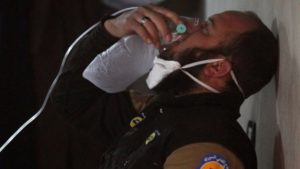by WorldTribune Staff, April 5, 2017
Israel believes the chemical weapons attack on a Syrian rebel-held town was approved at the highest levels of the Assad regime and doubts the explanation from Moscow and Damascus.
The official report said the town was exposed to deadly sarin gas after a conventional Syrian airstrike hit a rebel-held depot containing the toxic agent.

At least 100 people died, including many children, and 400 people suffered respiratory problems after the April 4 attack on the town of Khan Sheikhoun, according to a Syrian medical relief group.
Israeli sources said they believe the attack “was intended to convey a threatening message to insurgent groups that have broken the cease-fire agreement over the past two weeks,” Haaretz reported on April 5.
The sources said Syrian President Bashar Assad, or senior officials in his regime, approved the use of chemical weapons “against the backdrop of growing confidence in the regime’s stability following military successes since the regime completed its takeover of Aleppo in December.”
Israeli security officials believe the Assad regime kept residual quantities of chemical weapons, including sarin nerve gas, after the 2013 agreement to dismantle its chemical stockpiles.
The Syrian army published a statement denying any use of chemical weapons.
Russian Defense Ministry spokesman Maj. Gen. Igor Konashenkov said in a statement on April 5 that the Russian military assets registered a Syrian air force strike on April 4 on weapons depots and an ammunition factory on the eastern outskirts of Khan Sheikhoun.
Konashenkov said chemical weapons were produced by the factory, adding that the same type of chemical weapons had been previously used by the rebels in Aleppo, where they had caused symptoms similar to those seen in images from Khan Sheikhoun.
